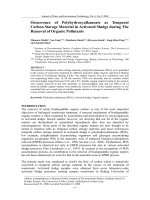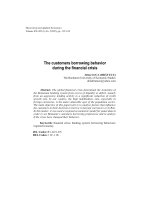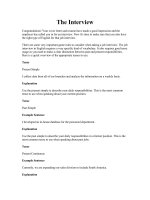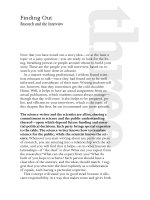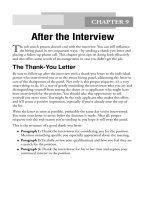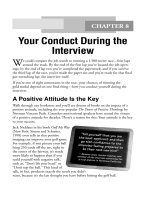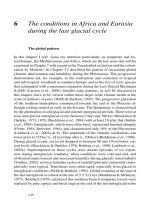Your Conduct During the Interview
Bạn đang xem bản rút gọn của tài liệu. Xem và tải ngay bản đầy đủ của tài liệu tại đây (213.8 KB, 14 trang )
“Tell yourself that you are
the best applicant and then
go with confidence to the
interview feeling prepared to
be their next new hire!”
—Science chair, mentor teacher, and
member of the interview committee for
a rural district in Northern California
CHAPTER 8
Your Conduct During the
Interview
W
e could compare the job search to running a 1,500-meter race…four laps
around the track. By the end of the first lap you’ve located the job open-
ings; by the end of lap two you’ve completed the paperwork; and if you survive
the third lap of the race, you’ve made the paper cut and you’re ready for that final
gut-wrenching lap: the interview itself.
If you’re one of eight contestants in the race, your chances of winning the
gold medal depend on one final thing—how you conduct yourself during the
interview.
A Positive Attitude Is the Key
Walk through any bookstore and you’ll see dozens of books on the impact of a
positive attitude, including the ever-popular The Power of Positive Thinking, by
Norman Vincent Peale. Countless motivational speakers have touted the virtues
of a positive attitude for decades. There’s a reason for this: Your attitude is the key
to your success.
Jack Nicklaus in his book Golf My Way
(New York: Simon and Schuster,
1998) even tells us that positive
imaging can improve your golf game.
For example, if you picture your ball
lying 250 yards off the tee, right in
the center of the fairway, it’s much
more likely to happen than if you
scold yourself with negative talk,
such as, “Don’t lift your head” or
“Don’t top the ball.” This kind of
talk, in fact, produces exactly the result you didn’t
want, because it’s the last thought you have before hitting the golf ball.
________________________________________ Chapter 8: Your Conduct During the Interview
© JIST Works
141
So, the key is to have a positive attitude, always expecting the best to happen. But
how can this help you during your job interview? Well, what works in golf also
works in life. If you picture yourself doing well and being chosen to fill the
position, it’s more likely to happen.
Most candidates enter the interview room feeling like they’re going on trial—as if
the interview panel will sit in judgment of how they perform. If there’s a table
between the candidate and the panel—which there usually is—it creates an even
greater barrier. However, the truth of the matter is this:
You are not on trial!
●
The table that sits between you is only a perceived barrier.
●
The panel wants to help you.
●
They want you to sell yourself.
●
They want you to be the one they hire.
You see, they’re on your side; it’s not an adversarial situation. They want to find a
terrific teacher to fill the vacancy, and they hope you’re the one.
As you sit in the lobby waiting for your turn to be
interviewed, remember that you must make a great
first impression—there are no second chances.
Think of how you feel sitting in an audience when
an entertainer or comedian steps on stage; it takes
only 10 seconds to know whether or not you like
the person.
It’s the same way with a job interview. You have to make them like you in
the first 10 seconds—no retakes, no do-overs. So visualize yourself doing just
that, and then, as your name is called and you walk into the interview room,
stand straight, hold your head high, shake hands, and smile as you look each
panel member straight in the eye.
Questions You Should Ask
At some point during the interview, you’ll be expected to ask questions of your
own. Often, interviewees take a somewhat defensive role, merely listening and
responding to the questions asked by the panel. Depending on how comfortable
you are, you might not feel like breaking in with a question of your own. Then
again, depending on how things are going, you might feel at ease to ask a ques-
tion at any point.
“Speak from your
heart…your love for
children will come
through.”
—High school special
education teacher in
Wisconsin
© JIST Works
Inside Secrets of Finding a Teaching Job ___________________________________________
142
In either case, you definitely want to
have questions prepared beforehand. If
your questions are not answered in the
course of the interview, be sure to ask
them before you conclude. Typically,
toward the end of the interview, the
panel will ask whether you have any
questions. At this point an answer
such as, “No, I think you’ve
answered them all” or “No, I can’t
think of anything” is not going to
look good. They expect you to be curious about
things, and if you’ve thought this out in advance, it will impress them.
Don’t rely on memory for these important questions. Practice asking them out
loud before the day of the interview and then jot them down on a 3 × 5 card and
bring the card with you to the interview. The interview panel will be impressed
that you put some forethought into the interview process.
Before getting into examples of
questions you might want to ask, we
want to caution you on being too
aggressive with your questioning.
Keep in mind that you are the
interviewee. Yes it’s true, you are
interviewing them, too. You want to
find out whether the job is a good
fit. And using your mission
statement as a guide, there are
certain things you must learn
about the position, the school, the
district, and so on. But remember to ask your questions in such a way that you
don’t give the impression you’re “taking over” the interview.
Also, there are certain kinds of questions we recommend avoiding; these we’ll talk
about a little later in this chapter.
Ask Questions That Showcase Your Talents
Back to the questions you’ll want to ask: There’s a little twist that can work for
you just as well as it works for the interview panel. We mentioned in chapter 6
that interviewers’ questions often have underlying purposes. For example, when
“Don’t be afraid to ask ques-
tions. Prepare some, even on a
card, so that you appear to
be well-prepared.”
—8th-grade teacher and member of
the hiring committee for a
suburban district in Illinois
“Jot down any questions
that come to mind during
the interview itself.”
—8th-grade teacher and member
of the hiring committee for a
suburban district in Illinois
________________________________________ Chapter 8: Your Conduct During the Interview
© JIST Works
143
they ask, “What are your strengths and weaknesses?” or “Tell us about yourself,”
what they really want to know is, “Why should we hire you?” Well, there’s no
reason your questions can’t have an underlying purpose as well: that is, to show-
case your talents. Here are a few examples of questions you might ask:
●
I’ve had some experience working on a school yearbook, and I really
enjoyed working with the students. Do you have a yearbook?
●
I’ve always considered myself a team player and feel it’s important and more
productive when staff members can put their heads together. Do the
teachers at this school plan or work on projects together?
●
I have experience in choral music and theater production and would like to
be involved in that in some way. Does your school offer any music or drama
for the kids or the community?
The underlying purpose of these questions is to show that you have talents that
can be of benefit to the school and the community. They also demonstrate that
you are an enthusiastic team player, willing to give more time and energy than
any of the other candidates the panel is interviewing.
There are other questions you can ask that might impress the panel. These
questions demonstrate your knowledge, enthusiasm, and interest. When we asked
interview panel members what questions they felt teacher candidates should ask
during an interview, we got these suggestions:
1. In what ways do the parents get involved with the school?
2. What kinds of cross-cultural activities do you offer to the kids and the
community (assuming an ethnic diversity exists)?
3. What new innovations or programs has the school or the district imple-
mented (for your grade level or subject area)?
4. Does the school or district have a general discipline plan (for example,
Canter & Canter, Assertive Discipline)?
5. Does the school or district have a mentor-teacher program?
6. Are the classrooms self-contained or departmentalized?
7. Is there team teaching?
8. Do you offer professional growth opportunities for new teachers?
9. What are the strengths of this school/district?
10. How do administrators offer teacher support if the need arises?
11. How would you characterize school morale?
12. When will you be notifying candidates of your hiring decisions?
© JIST Works
Inside Secrets of Finding a Teaching Job ___________________________________________
144
This is not an exhaustive list; it’s meant to suggest some ideas for you to consider.
Some might not seem important or applicable to you, but because they were
suggested by members of hiring panels, we think they should be given some
weight.
Direct Your Questions Appropriately
One great piece of advice came from a school
principal we interviewed, who said that the teacher
candidate should never address a specific member of
the panel. For example, you should never ask, “Ms.
Johnson, what is your district’s policy regarding
bilingual education?”
This is a mistake for several reasons. First,
Ms. Johnson might not know about the policy, or there might not be a
specific policy. Also, Ms. Johnson might not agree with the district’s philosophy
of bilingual education, which could result in a very awkward moment for every-
one. The results of this kind of questioning leave Ms. Johnson looking bad and
feeling embarrassed, which means the candidate scores badly.
If you think a question is legitimate, you should ask it, of course; but direct it to
the entire committee. One word of advice: Always ask sincere questions that are
important to you. If your questions impress the interview committee or give you a
chance to tell them something more about yourself, that’s simply an added bonus.
The important thing to remember is this: You should come prepared with a few
well-thought-out questions; that will impress the interview panel.
Questions to Avoid
Just as important as the questions you ask are those you don’t. There are some
questions you should simply avoid asking. Most of these are fairly obvious. But,
according to our hiring panel contacts throughout the United States, a few words
should be mentioned here about indiscreet, inappropriate questions. Then there
are those questions that are not necessarily indiscreet or inappropriate, but that,
in a subtle way, can put you on thin ice and work against you.
Before we list the questions to avoid, however, let us mention one caveat that
applies to your whole demeanor, including your questions of the hiring panel: the
matter of attitude. If your attitude is perceived as even slightly questionable, it
probably will undo all the positives you’ve worked so hard to develop and com-
municate. We don’t want you to mess up a good thing because of a slip of the
tongue or an indiscretion. So avoid any question that makes your attitude
“Don’t ever ask a direct
question of a certain
individual sitting on the
hiring panel. It puts the
person on the spot.”
—California school administrator
and member of the hiring panel

